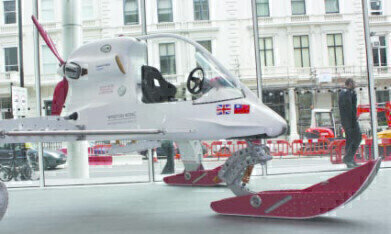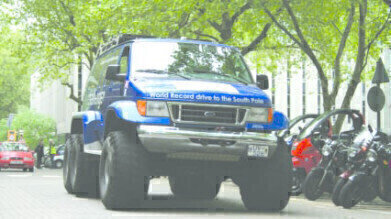News
Six-wheel drive mobile laboratories
Oct 20 2010
Six-wheel drive mobile laboratories, a biofuelled ice vehicle that glides on skis, and the latest in wireless mobile sensors were displayed earlier this month at Imperial College London, which will be supporting a team of explorers and scientists making final preparations for a record-breaking 3,600 mile scientific expedition via the South Pole cross Antarctica, the driest and coldest continent on Earth. Imperial scientists in partnership with the Moon Regan Transantarctic team, will gather data in a number of research areas, while aiming to improve on the time for the fastest vehicle crossing of Antarctica and also be the first to test biofuel while travelling across this extreme environment.
A network of mobile wireless sensors will be used to continuously monitor the environment, the vehicles and the explorers themselves during the expedition, which is due to start in November.
Dr Robin North, from the Centre for Transport Studies at Imperial College London, said: "The Moon Regan Transantarctic Expedition offers a lucky few of us a rare opportunity to measure, monitor and learn in one of the world’s last great wilderness and to collect research data for ourselves and for our colleagues back home. Our two sixwheeled mobile laboratories and the Winston Wong Bio-Inspired Ice Vehicle will take us on an epic journey across the continent. All the while, the wireless latest technology will monitor and measure every aspect of the journey. We’ll test the effectiveness of global satellite navigation systems, track our own impact on the Antarctic environment; and continuously monitor our bodies’ response to the extreme conditions."
During the expedition, the network of wireless sensors will continually record and transmit data to a computer that will be stored in one of the SSVs, so that scientists and explorers can access information about the expedition in the real time. The computer will also be connected to a satellite phone so that information from the sensors can be beamed back to the UK for further analysis by the researchers based at the College.
The expedition will take approximately 40 days to complete. The team will begin on the west coast of Antarctica, leaving from Patriot Hills on around 16 November. They will journey via the South Pole, arriving at the McMurdo research station on the east coast in about two weeks. They will return to Patriot Hills via the same route, arriving back on around 15 December.
Andrew Regan, expedition principal, said: "The Antarctic is a hostile and punishing environment, with the coldest temperatures on Earth. The terrain is unforgiving and the sastruggi and crevasse fields can be treacherous. It is a rare privilege to experience this remarkable continent and to be able to work with our science partner, Imperial College London, to gather important research data. The world has much to learn from Antarctica."
The project is supported by the Faculty of Engineering, the Department of Civil and Environmental Engineering and the Winston Wong Centre for BioInspired Technology at the Institute of Biomedical Engineering. The expedition is sponsored by Imperial alumnus Professor Winston Wong.
Digital Edition
Lab Asia Dec 2025
December 2025
Chromatography Articles- Cutting-edge sample preparation tools help laboratories to stay ahead of the curveMass Spectrometry & Spectroscopy Articles- Unlocking the complexity of metabolomics: Pushi...
View all digital editions
Events
Jan 21 2026 Tokyo, Japan
Jan 28 2026 Tokyo, Japan
Jan 29 2026 New Delhi, India
Feb 07 2026 Boston, MA, USA
Asia Pharma Expo/Asia Lab Expo
Feb 12 2026 Dhaka, Bangladesh




















